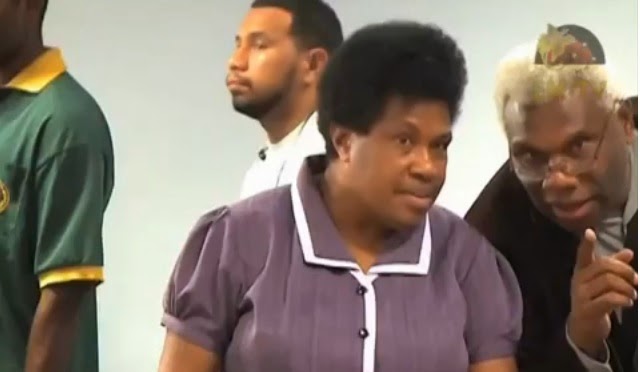High Powered Government Delegation Addresses Unitech Students, Underscoring the Fears and Incompetency of the O’Neill Government
On Thursday, the National Research Institute came out strongly against the K3 billion loan approved by Prime Minister Peter O’Neill to buy shares in Oil Search as fiscally unsound. UPNG students are also expressing outrage at the loan and thus join Unitech students in opposing the prime minister. A growing national outcry against the O’Neill government is developing around the loan issue, as well as the Paul Paraka corruption scandal, the nationalisation of Ok Tedi and related destruction of the much praised Sustainable Development Programme, and a growing sentiment that the O’Neill government itself has become dangerously dictatorial.
In the midst of all this, a high powered government delegation flew to Lae to address boycotting Unitech students last Friday. The team was led by Attorney General Kerenga Kua, accompanied by Trade & Commerce Minister Richard Maru, State-Owned Enterprises Minister Ben Micah and HERST Minister Delilah Gore.
This team’s willingness to enter the unfriendly territory of the Unitech campus indicated just how fearful the government has become of the Unitech boycott and its potential to spark a national rebellion against the O’Neill government.
In sharp contrast to her previous threats to the students, this time Minister Gore remained in the background, a tacit admission that Peter O’Neill trusts her as much as deposed Minister David Arore to settle the crisis. O’Neill has not passed the ball of responsibility to Unitech’s senior executive management. Last Friday, they were pushed into the role of observer, showing that the Prime Minister no longer views Acting VC John Pumwa or his staff as capable of managing the situation.
At Friday’s public forum, the Attorney General did most of the talking. Unlike the bellicose government statements of previous week, there was no public demand that students abandon their boycott and go back to class nor was there any threat of punishment if they didn’t.
Remarkably, Attorney General Kua accepted without dissent that students would continue the boycott into Week Four. By letting students stay out of class, he was perhaps hoping that they would make less noise, thus reducing the likelihood of agitating students at the other campuses. In fact, the conciliatory, even pleading tone of Kua’s speech underscored the government’s desperation to somehow pull Unitech students off-line from the greater national protest against the Prime Minister.
Kua began his remarks by stating that the whole saga was caused by a basic disrespect for law. The irony of this being stated by a member of the very government that first came to power by ignoring a Supreme Court ruling was not lost on all listeners.
In fact, in the case of Unitech it was the O’Neill government that ignored the Unitech Act of 1986 by appointing an interim Council, instead of instituting criminal proceedings against members of the old council to remove them from the existing council. Obviously this was purposeful; in protecting Philip Stagg, Peter O’Neill was protecting his unofficial guardian of many years past, after O’Neill had been effectively abandoned by his blood family. O’Neill was also protecting university schoolmate Ralph Saulep.
We cannot overlook the fact that it was the O’Neill government’s Office of Migration that blocked the return of Unitech Vice Chancellor Albert Schram to Papua New Guinea without reason and then cancelled his work visa without cause. We cannot forget that the Prime Minister himself established an informal inquiry (Sevua) last January that from the start had no legal power because it was not legally constituted as a formal commission of inquiry. We recall the sting of the O’Neill government bullying the exiled Vice Chancellor Albert Schram by repeatedly stating they were terminating him and were taking him off salary, even though they had no legal power to do so.
None of the above suggests that the O’Neill government has any respect for the law as Attorney General Kua states we must. Thus, the Attorney General’s assessment of what had caused Unitech Saga was tacit admission that the O’Neill government deserves full blame for causing the Unitech crisis.
Forced into a political corner, Peter O’Neill has a tremendous talent for flip-flopping. Not surprisingly, he has become a sudden born again in appreciating the importance of following the law. Thus, the O’Neill government cites one court order as the reason why they must bring back the hated former council headed by Chancellor Philip Stagg and Pro Chancellor Ralph Saulep to govern Unitech. The government has embraced another court ruling in favour of Stagg and Saulep that they interpret as keeping Albert Schram from carrying out his duties as Vice Chancellor. They also cite unspecified court cases in not releasing the Sevua report.
Despite the legal minefield they say constrains the government, last Friday the delegation was desperate to make a deal with the Unitech SRC. The students’ unyielding position finally broke down the delegation into promising an important first step. They agreed to allow Albert Schram to come back to Papua New Guinea, with Attorney General Kua saying that he himself had lifted the ban on Schram several weeks ago when briefly serving as Acting Foreign Minister. Mr Kua coyly did not say who within government established the ban in the first place. He also provided no explanation as to why, after weeks of student uproar, he only now has woken up to the fact that Schram remains stranded in Australia seven months after having filed an application for a new work visa.
If last Friday’s delegation expected cries of appreciation for agreeing letting Dr Schram come back into PNG, they were disappointed. It was apparent that the students have experienced enough exposure to government promises that they know not to ease up on the pressure until they see some deliverables. In response, Attorney General Kua noted that the NEC would meet again this coming Wednesday and promised a report on Thursday as to what more had been accomplished to address the students’ demands.
At the centre of broken government promises lies the Office of Higher Education. Exactly one year ago, OHE’s Unitech Dialogue Committee sent a letter to Unitech’s SRC and administration. The letter laid out the same argument of legal obstacles that the government has used during the past three weeks. It states that “the government is in dialogue with the Stagg council and other parties to discuss these issues. The eventual outcome of these discussions is to solicit their conscience to withdraw the multiple court injunctions or legal minefields that have been created and allow the progression into establishing the new university Council”. The letter furthermore notes that “OHE has already begun the process of establishing a team of legal scribes to put before parliament recommendations for amending the University Acts to ensure there is clear authority in place to deal with similar such issues pertaining to University Councils” and that “the government has commissioned this team to forge dialogue with staff and students to facilitate the process for a win-win outcome”.
One year has passed and OHE has accomplished none of the above under the incompetent leadership of Professor David Kavanamur who stated earlier to Unitech students that he has no power! Equally at fault is Unitech Acting Vice Chancellor John Pumwa who failed to do anything from the Unitech side despite his moral obligation to push Unitech’s interests and pressure OHE to complete the process outlined in March 2013.
All this is strong evidence why the Unitech student boycott must continue, even if it means the cancellation of the 2014 academic school year. The O’Neill government simply will not move unless there is fearful pressure. Fearful pressure has now taken the form of a Unitech boycott that, with greater SRC networking with other SRCs, could trigger a national uprising.
The government and the Unitech senior executive management failed to achieve anything until the students gave them some much-needed incentive to get moving. Maybe OHE needs similar incentive. Let Unitech students immediately raise a mighty cry heard throughout the land that Philip Stagg and Ralph Saulep must resign immediately or be held fully responsible for whatever is yet to transpire in the Unitech saga. Let the students force the government to stop pretending that anything stops them from releasing the Sevua report and simply release it. If legal challenges eventuate, surely they can handle it. After all, can’t the O’Neill government tap into the high priced legal services of Paul Paraka?








Comments
Post a Comment
Please free to leave comments.